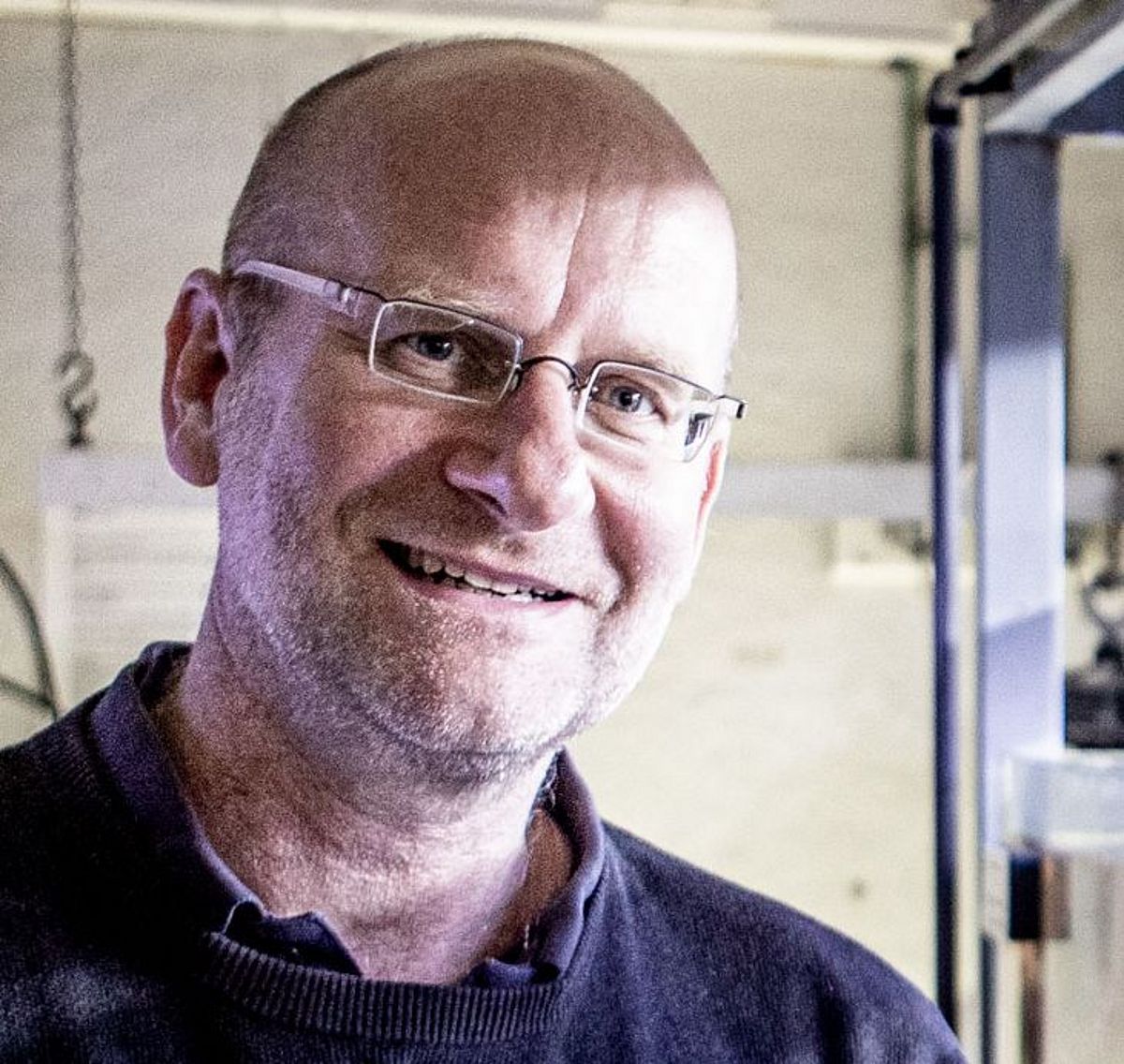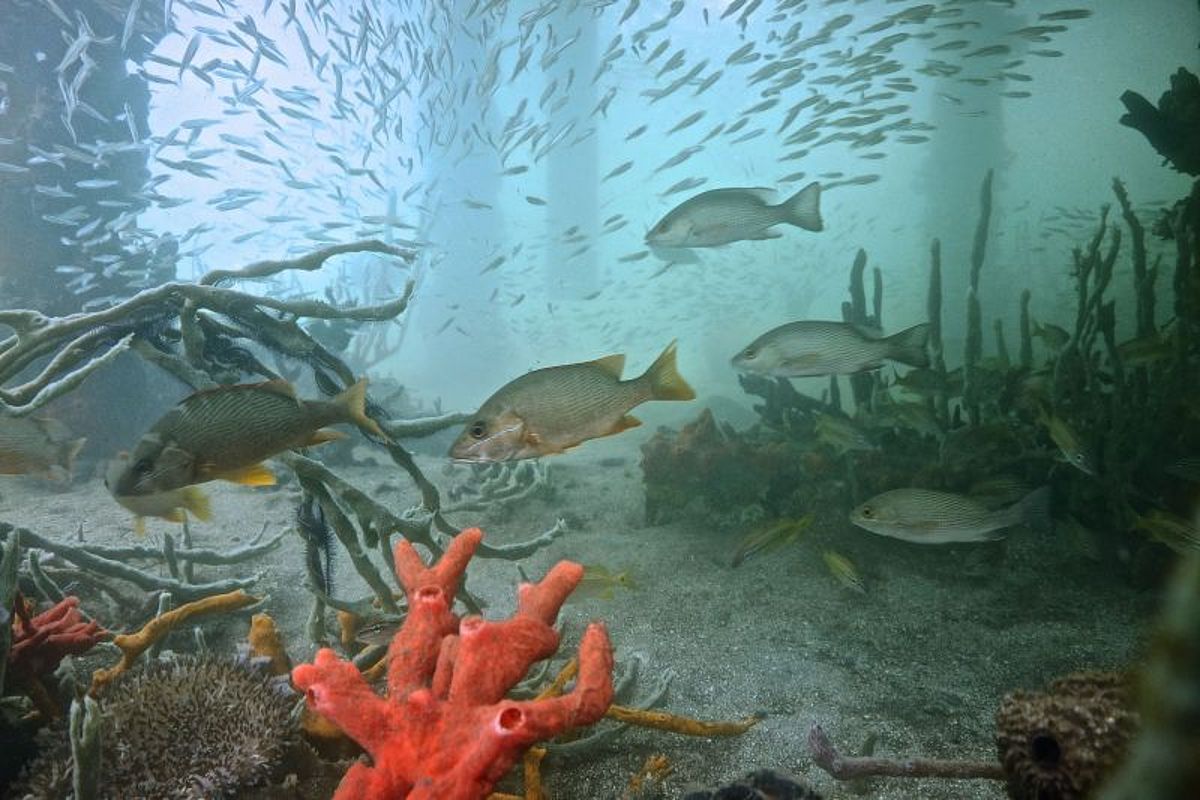Prof. Dr. Thorsten B. Reusch
Head of Research Division 3 - Marine Ecology
Head of Research Unit - Marine Evolutionary Ecology

Office:
Room: 1.502
Phone: +49 431 600-4550
E-Mail: treusch(at)geomar.de
Address:
GEOMAR
Helmholtz Centre for Ocean Research Kiel
Wischhofstr. 1-3
D-24148 Kiel
Germany
my Orchid:htttps://orcid.org/0000-0002-8961-4337
Outreach
https://www.forschung-und-lehre.de/forschung/suche-nach-klima-resistentem-super-seegras-5573 (in German)
https://www.geo.de/natur/oekologie/temperatur-der-ozeane-kann-neue-wetterextreme-befeuern----33438620.html (in German)
https://www.reuters.com/investigates/special-report/germany-climate-seagrass/
https://www.deutschlandfunkkultur.de/seegras-klimaschutz-artenschutz-ostsee-100.html
https://www.wetter.de/spezial/klima-update
Klimaretter Seegras | Die Nordreportage | NDR Doku https://www.youtube.com/watch?v=PD1GgFj5qo8
Podcast: https://open.spotify.com/episode/2Iqq4yNQr7NQafa8esEmvH
Scientific interests
The focus of my research is the ecology of evolution. Any ecological interaction is also a selection pressure. Consequently, if there is heritable variation, evolutionary change will take place. There is now ample evidence that the separation between ecological and evolutionary scale is misleading, in particular in marine systems. Both time scales are commensurate and should be answered within a common framework. Given the predicted environmental changes in the next decades, one focus area is the evolutionary response of populations to global change, including ocean warming, acidification, biological invasions and selective harvesting. Towards this end, both heritable variation within populations, and the distribution of genetic variation across latitudinal gradients needs to be quantified. Such an approach will benefit from an expansion of the evolutionary ecology toolbox. Once selectively relevant polymorphism is identified, predictions on the evolutionary potential of populations become possible.
Specific research areas are
• Evolutionary biology & population genetics
• host-parasite interactions
• Evolutionary consequences of global change
• Invasion biology
• Marine Genomics
Study organisms
• cod Gadus morhua
• reef building coral and cnidarians
• seagrasses Zostera marina
• comb jellies (Ctenophora)
Selected Publications
For a full overview on my publications see my google scholar profile https://scholar.google.de/citations?user=ux41yIwAAAAJ&hl=en"
- Han KY, Brennan RS, Monk CT, Jentoft S, Helmerson C, Dierking J, Hüssy K, Kokubun ÉE, Fuss J, Krause-Kyora B, Thomsen TB, Heredia BD, Reusch TBH (2025) Genomic evidence for fisheries-induced evolution in Eastern Baltic cod. Sci Adv 11: eadr9889 doi 10.1126/sciadv.adr9889 –study provides the first evidence that overfishing has altered the genetic composition in a marine fish population. Wide attention in global media, highlighted by 138 media outlets, including Guardian, New York Times, The Telegraph, Boston Globe. Germany: Spiegel, N-TV, Tagesschau. Altmetric score 1040
- Yu L, Renton J, Burian A, Khachaturyan, Bayer T, Kotta J, Stachowitz JJ, DuBois K, Baums IB, Werner B, Reusch TBH (2024) A somatic genetic clock for clonal species. Nature ecology & evolution, https://www.nature.com/articles/s41559-024-02439-z see also: https://www.nature.com/articles/s41559-024-02439-z
– Introduces the somatic genetic clock as novel tool to age modular species, including a test of assumptions via modeling. Wide attention in global media, picked up by 38 news outlets; Altmetric score 295 -
Yu L, Khachaturyan M, Matschiner M, Healey A, Bauer D, Cameron B, Cusson M, Emmett Duffy J, Joel Fodrie F, Gill D, Grimwood J, Hori M, Hovel K, Hughes AR, Jahnke M, Jenkins J, Keymanesh K, Kruschel C, Mamidi S, Menning DM, Moksnes P-O, Nakaoka M, Pennacchio C, Reiss K, Rossi F, Ruesink JL, Schultz ST, Talbot S, Unsworth R, Ward DH, Dagan T, Schmutz J, Eisen JA, Stachowicz JJ, Van De Peer Y, Olsen JL, Reusch TBH (2023) Ocean current patterns drive the worldwide colonization of eelgrass (Zostera marina). Nature Plants online early, doi 10.1038/s41477-023-01464-3
Describes and dates the spread of the most widespread seagrass species from its origin in the West Pacific to the East Atlantic in a stepping-stone fashion, involving several genetic bottlenecks.
See also related research briefing: Reusch TBH, Olsen JL (2023) Reconstructing the worldwide colonization history of the world’s most widespread marine plant. Nature Plants online early doi 10.1038/s41477-023-01465-2 -
Reusch, TBH, Baums IB, Werner B (2021) Evolution via somatic genetic variation in modular species. Trends in Ecology and Evolution 36: 1083-1092
-
Jaspers C, Ehrlich M, Pujolar JM, Künzel S, Bayer T, Limborg MT, Lombard F, Browne WE, Stefanova K, Reusch TBH (2021) Invasion genomics uncover contrasting scenarios of genetic diversity in a widespread marine invader. Proceedings of the National Academy of Sciences 118: e2116211118 doi 10.1073/pnas.2116211118
-
Yu, L., C. Boström, S. Franzenburg, T. Bayer, T. Dagan, and Reusch TBH (2020). Somatic genetic drift and multilevel selection in a clonal seagrass. Nature Ecology & Evolution 4:952–962. https://doi.org/10.1038/s41559-020-1196-4
see also https://natureecoevocommunity.nature.com/posts/the-evolving-clone -
Roth O, Solbakken MH, Tørresen OK, Bayer T, Matschiner M, Baalsrud HT, Hoff SNK, Brieuc MSO, D. Haase D, Hanel R, Reusch TBH*, Jentoft S* (2020). Evolution of male pregnancy associated with remodeling of canonical vertebrate immunity in seahorses and pipefishes. Proceedings of the National Academy of Sciences USA, online early: doi.org/10.1073/pnas.1916251117. *equal contrib
- Heckwolf MJ, Meyer BS, Häsler R, Höppner MP, Eizaguirre C, Reusch TBH (2020) Two different epigenetic information channels in wild three-spined sticklebacks are involved in salinity adaptation. Science Advances 6:eaaz1138 https://advances.sciencemag.org/content/6/12/eaaz1138
- Laikre, L., S. Hoban, M. W. Bruford, G. Segelbacher, F. W. Allendorf, G. Gajardo, A. G. Rodríguez, P. W. Hedrick, M. Heuertz, P. A. Hohenlohe, R. Jaffé, K. Johannesson, L. Liggins, A. J. MacDonald, P. OrozcoterWengel, TBH Reusch, H. Rodríguez-Correa, I.-R. M. Russo, N. Ryman, and C. Vernesi. 2020. Post-2020 goalsoverlookgeneticdiversity. Science 367:1083
- Reusch TBH, Dierking J, Andersson HC, Bonsdorff E, Carstensen J, Casini M, Czajkowski M, Hasler B, Hinsby K, Hyytiäinen K, Johannesson K, Jomaa S, Jormalainen V, Kuosa H, Kurland S, Laikre L, MacKenzie BR, Margonski P, Melzner F, Oesterwind D, Ojaveer H, Refsgaard JC, Sandström A, Schwarz G, Tonderski K, Winder M, Zandersen M (2018) The Baltic Sea as a time machine for the future coastal ocean. Science Advances 4:eaar8195
- Breusing C, Biastoch A, Drews A, Metaxas A, Jollivet D, Vrijenhoek RC, Bayer T, Melzner F, Sayavedra L, Petersen JM, Dubilier N, Schilhabel MB, Rosenstiel P, Reusch TBH (2016) Biophysical and population genetic models predict presence of "phantom" stepping stones connecting Mid-Atlantic Ridge vent ecosystems. Current Biology 26:2257–2267
- Olsen JL*, Rouzé P, Verhelst B, Lin Y-C, Bayer T, Collén J, Dattolo E, De Paoli E, Dittami S, Maumus F, Michel G, Kersting A, Lauritano C, Lohaus R, Töpel M, Tonon T, Vanneste K, Amirebrahimi M, Brakel J, Boström C, Chovatia M, Grimwood J, Jenkins J, Jüterbock A, Mraz A, Stam WT, Tice H, Bornberg-Bauer E, Green P, Pearson G, Procaccini G, Duarte C, Schmutz J, Reusch TBH*, Van de Peer Y* (2016) The genome of the seagrass Zostera marina reveals angiosperm adaptation to the sea. Nature 530: 331-335 doi: 10.1038/nature16548 *equal contribution (cover story) – Highlighted in Williams, S: From Sea to Sea (doi.org/10.1038/nature16869)
- Schlüter L, Lohbeck KT, Gutowska MA, Gröger JP, Riebesell U, Reusch TBH (2014) Adaptation of a globally important coccolithophore to ocean warming and acidification. Nature Climate Change 4:1024–1030, doi:10.1038/nclimate2379
- Sunday JM, Calosi P, Dupont S, Munday PL, Stillman JH, Reusch TBH (2014) Evolution in an acidifying ocean. Trends in Ecology and Evolution 29:117-125
- Lohbeck, KT, Riebesell U, Reusch TBH (2012) Adaptive evolution of a key phytoplankton species to ocean acidification. Nature Geoscience 5:346-351 [article]
- Frommel AY, Maneja R, Lowe D, Malzahn AM, Geffen AJ, Folkvord A, Piatkowski U, Reusch TBH, Clemmesen C (2012) Severe tissue damage in Atlantic cod larvae under increasing ocean acidification. Nature Climate Change 2: 42-46
- Franssen SU, Gu J, Bergmann N, Winters G, Klostermeyer UC, Rosenstiel P, Bornberg-Bauer E, Reusch TBH (2011) Transcriptomic resilience to global warming in the seagrass Zostera marina, a marine foundation species. Proc Natl Acad Sci USA 108:19276-19281
- Reusch, TBH, A Ehlers, A Hämmerli, B Worm (2005) Ecosystem recovery after climatic extremes enhanced by genotypic diversity. Proc Natl Acad Sci USA 102: 2826-2831
- Wegner KM, Kalbe M, Kurtz J, Reusch TBH, Milinski M (2003) Parasite selection for immunogenetic optimality. Science 301: 1343.
- Reusch TBH, Häberli MA, Aeschlimann PB, Milinski M (2001) Female sticklebacks count alleles in a strategy of sexual selection explaining MHC polymorphism. Nature 414: 300-302.
Current projects
-
ZOBLUC: Seegras-Zostera marina als Blue Carbon- Kohlenstoffspeicher in der Ostsee", Ministerium für Energiewende, Klimaschutz, Umwelt und Natur Schleswig Holstein MEKUN, project period 01/2025-09/2030. Coordination Thorsten Reusch; together with State Agency for the Environment (LfU), Kiel University (co-PIs Prof. Natascha Oppelt; Dr. Jens Schneider), total amount 6.020 Mio €
-
"Endophytes and local adaptation modulate aquatic plant responses to warming and anoxia stress", funded by Deutsche Forschungsgemeinschaft within Kiel University Research Group PlantCoChallenge (coordionation Prof Eva Stukenbrock), Co-PI Prof Sabine Hilt, IGB Berlin, 2024-2028
-
"SeaStore 2 - Diversity Enhancement through Seagrass Restoration", funded by BMBF Mare: N programme, coordinator Dr. Maike Paul, LUFI Univ Hannover, 2024-2027, see www.seegraswiesen.de
-
“Fisheries induced evolution“, funded by DFG-funded Research Training Group Translational Evolutionary Research TransEvo (coordinator Hinrich Schulenburg, U Kiel) ; Co-PI Martin Quaas, iDIV, 2020-2023, second phase 2023-2026 (Doctoral student Lingfeng Meng)
Recently completed projects
- "Upscaling Biodiversity Enhancement and Blue Carbon through Seagrass Restoration – UpBlueSea"", Ministerium für Energiewende, Klimaschutz, Umwelt und Natur Schleswig Holstein, project period 04/2024-06/2025
- “Adaptive asexual evolution in corals, cancer and seagrasses – AdaptAsex“, funded by Human Frontiers of Science Programme (HFSP) . CO-Pis Iliana Baums, Penn State Univ, USA; Benjamin Werner, Queen Mary Univ London, 2020-2023
- "SeaStore - Diversity Enhancement through Seagrass Restoration", funded by BMBF Mare: N program, coordinator Dr. Maike Paul. LUFI University Hannover, 2020-2023, see www.seegraswiesen.de (in German) see first key publication:Reusch TBH, Baums IB, Werner B (2021) Evolution via somatic genetic variation in modular species. Trends in Ecology and Evolution online early doi https://doi.org/10.1016/j.tree.2021.08.011; see press release: https://www.uni-kiel.de/en/details/news/215-reusch-tree
- "IMMUBASE - Comparative Immunogenomics of basal marine metazoans", funded by Deutsche Forschungsgemeinschaft within Sequencing Initative Programme, Co-PIs Lucia Pita Galan GEOMAR, Ruth Schmitz-Streit, U Kiel, 2019-2022
- "Seagrass Blue Carbon", funded by Helmholtz-Society Climate Initiative Germany Net Zero 2050, work package 4 natural carbon storage systems, 2019-2021, with postdoctoral researcher Dr. Angela Stevenson
- "Microbiota – host interactions at the base of the metazoan tree", funded by Deutsche Forschungsgemeinschaft within Collaborative Research Center 1182 Origin and Function of the Metaorganism - Co-PI Ruth Schmitz-Streit, U Kiel, 2016-2019
- "MARES Multi-method Assessment for Resilient Ecosystem Services and human-nature system integration", funded by EU-BONUS, (coordinator Dr. Maurizio Sajeva, Pellervo Economic Research, Finland), 2018-2020
- "BIO-C3 Biodiversity changes-causes, consequences and management implications", funded by European Union /BONUS programme, Coordinator Thorsten Reusch, 13 partners in total, 2014-2017
see key publication:
Reusch TBH, Dierking J, Andersson HC, Bonsdorff E, Carstensen J, Casini M, Czajkowski M, Hasler B, Hinsby K, Hyytiäinen K, Johannesson K, Jomaa S, Jormalainen V, Kuosa H, Kurland S, Laikre L, MacKenzie BR, Margonski P, Melzner F, Oesterwind D, Ojaveer H, Refsgaard JC, Sandström A, Schwarz G, Tonderski K, Winder M, Zandersen M (2018) The Baltic Sea as a time machine for the future coastal ocean. Science Advances 4:eaar8195
Memberships, Community and Editorial Functions
-
Steering Committee Kiel Plant Centre https://www.plant-center.uni-kiel.de/en/kiel-plant-science-1) 2019 -
- since 2017 member of steering committe of ISOS (Integrated School of Ocean Science) graduate school
- Associate Editor 'Marine Biology' and 'Science Advances'
- Coordination of the topic "Evolving Ocean" with the cluster of excellence Future Ocean
- Steering committee Kiel Evolution Centre
- Steering committee International Max-Planck School for Evolutionary Biology IMPRS
- Steering committee, Helmholtz-Institute for Functional Marine Biodiversity Research (HIFMB), Oldenburg, Germany
Career Stages
- Research group leader Marine Evolutionary Ecology
- since January 2012 Head of research division RD 3 - Marine Ecology
- September 2008 full professor of marine ecology and chair of research unit Marine Evolutionary Ecology at IFM-GEOMAR, Kiel
- 2005 Professorship in Plant Evolutionary Ecology at the Institute for Evolution & Biodiversity, University of Münster, Germany
- 2002-2005 Heisenberg-fellow of Deutsche Forschungsgemeinschaft DFG at the Max-Planck Institute for Limnology (now Evolutionary Biology) Plön, Germany
- 1999-2002 Research fellow at the Max-Planck Institute for Limnology, Plön, Germany
- 1997-1999 Marie-Curie fellow at University of Groningen, The Netherlands
- 1994-1997 German Academic Exchange Service and DFG stipend at Coastal Marine Institute San Diego, USA
- 1994 Dr. of Sciences at Institute of Marine Science IFM Kiel



